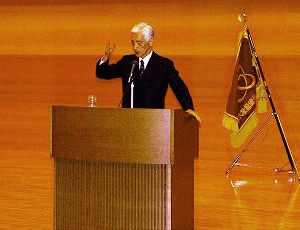From “The Definition of Human Services” by Shiro Abe,
President Emeritus, Kanagawa University of Human Services

The 20th century was an era during which the fields of health, medical care, and social welfare achieved dramatic advances. At the same time, however, increasing specialization, sophistication, and systematization, as well as different versions of similar services , resulted in greater barriers (in the form of inconsistencies, disparities, and disconnections) between the three fields. This made it difficult for service users to adapt from one field to another, thereby hindering solutions to their needs.
To reduce and surmount these barriers, we need to set a course based on a new “grand design” for the 21st century. This will mean establishing a shared view of humanity and society and reorganizing our health and welfare system structurally to shift from a provider-led system to one in which service users are central.
The aim of human services is to shift to a paradigm conducive to the formation of a social welfare–based society. Such a society would be founded on services in the fields of health, medical care, and social welfare that demonstrate respect for human rights—in terms of people’s dignity and their integrity as human beings—and express the interconnectedness of civic society in tangible form. The three specialist fields concerned should also be open to forging links with the fields of education and work.
Human services as a paradigm aims to create a new culture that seeks well-being for individuals and humankind founded on communities in which citizens are fully engaged. It requires the fields of health, medical care, and social welfare to take a holistic approach to dealing with the diverse problems human beings face. Meanwhile, the services that support people’s development and growth must fulfill their own specific functions and roles, while at the same time taking steps to coordinate with other specialties to increase the potential for collaboration and complementary effort in pursuit of overarching common goals. In this way services can be integrated, making them non-exclusive and user-oriented, and allowing highly practicable principles, methods, and systems to be put in place.

From “The Definition of Human Services” by Shiro Abe,
President Emeritus, Kanagawa University of Human Services